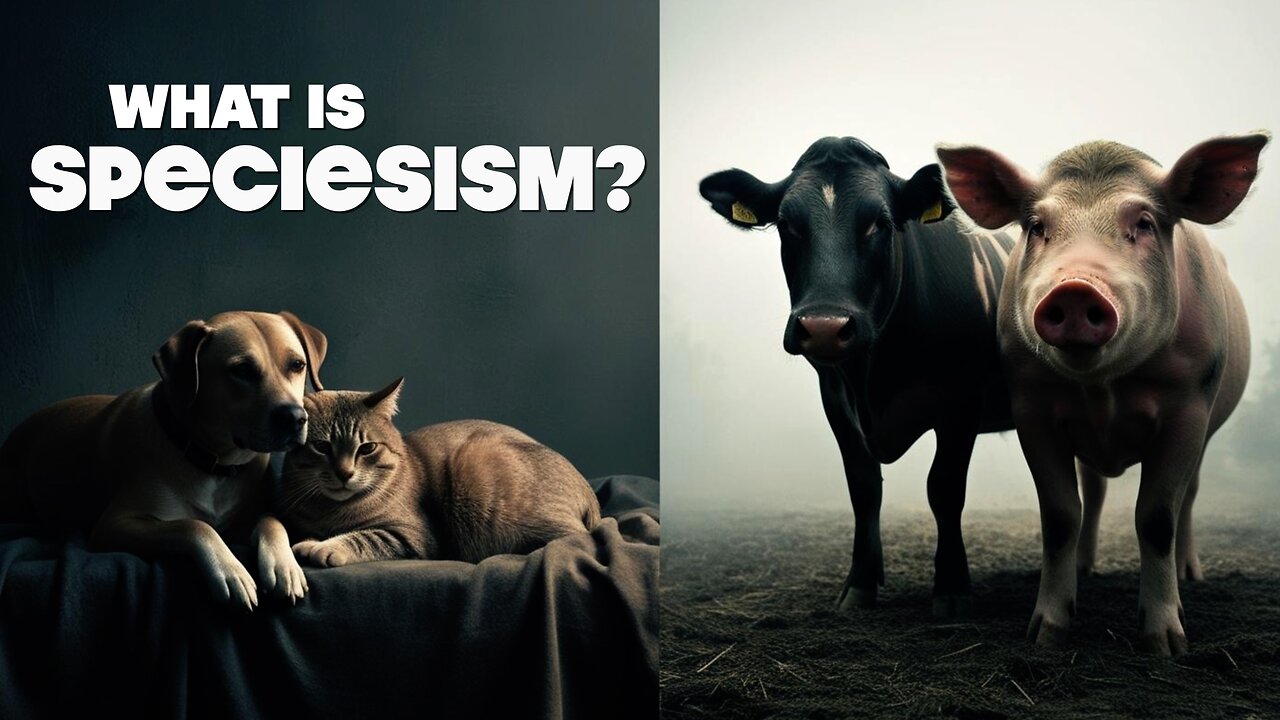Premium Only Content

What is Speciesism?
For video production services contact [email protected] https://www.inspiredrisk.com/
Speciesism is the belief that one species, typically humans, is superior to others. It influences how we treat animals daily. People adore their pets, dogs, cats, birds, but when it comes to cows, pigs, or chickens, they're often treated as commodities for food, clothing, or entertainment.
Historically, many cultures and religions have ingrained the belief that humans are superior to animals. Religious texts, like the Bible, have been interpreted to place humans at the top of the "creation hierarchy," justifying animal exploitation. This speciesism has become normalized in many societies.
Humans often favor their own species, creating biases that justify unequal treatment of non-human animals. These biases allow us to overlook the suffering of animals simply because they are different from us, even though they experience pain and emotions similarly.
The rise of industrial farming in the 20th century, coupled with the mass production of meat and dairy, has desensitized people to animal suffering. Industries that profit from animal exploitation work to maintain speciesist attitudes, using marketing to downplay the suffering of animals and normalize their exploitation.
From a young age, people are taught that some animals, like dogs and cats, are companions, while others, like cows and pigs, are resources for food. This socialization reinforces the idea that some animals deserve compassion more than others. For example, many are unaware that cows must be impregnated to produce milk.
Though many are aware that animals suffer, they often disconnect emotionally from the animals used for food, clothing, or entertainment. This defense mechanism allows them to continue their behavior despite the ethical implications. How many refuse to watch footage of factory farm abuse but still consume products like bacon or milk?
Modern farming practices have distanced people from the realities of animal exploitation. The suffering of animals is hidden from view, perpetuating speciesism by keeping the truth out of sight.
There’s also Anthropocentrism, the belief that humans are the most important species on Earth, reinforcing the idea that animals exist solely for human use. This worldview leads to the belief that human needs always outweigh the needs of non-human animals.
Speciesism is deeply rooted in culture, economics, psychology, and socialization. It’s perpetuated by historical norms, cognitive biases, and industries benefiting from animal exploitation. Practices like eating meat, wearing animal products, and using animals for labor or entertainment have been passed down through generations, becoming normalized.
At the core of speciesism is the belief in human superiority, which leads us to disregard the well-being of non-human animals. But is it fair? Is it ethical?
The term "speciesism" was popularized by philosopher Peter Singer in his 1975 book Animal Liberation. Singer argued that the primary consideration in how we treat animals should be their ability to suffer, not their species. He compared speciesism to racism or sexism, as all involve discrimination based on an arbitrary characteristic.
This matters because, like other forms of discrimination, speciesism leads to unnecessary suffering. Non-human animals can feel pain, fear, and joy, just like humans. Many animals, like pigs and cows, are more intelligent than we often give them credit for. And considering these are some of the most exploited animals in the Western world through factory farming, this truth is troubling.
The issue isn’t just about species but sentience—the capacity to feel. Animal rights activists argue that we must treat all sentient beings with equal moral consideration, meaning their ability to suffer should matter, regardless of species. This belief has fueled the rise of the vegan movement and plant-based diets, which have grown exponentially in the past decade.
Equal moral consideration means caring for animals not just because they look cute but because they can feel and have emotions like us.
The good news is that you can make a difference. Many are shifting to plant-based diets, choosing cruelty-free products, and rejecting unethical entertainment venues that exploit animals. By making mindful choices, we can help reduce speciesism’s impact. Whether it’s choosing plant-based foods, supporting animal welfare organizations, or simply being kinder to animals, it all adds up.
-
 1:01:07
1:01:07
VINCE
3 hours agoThe Walls Are Closing In On The Deep State | Episode 160 - 11/03/25
183K103 -
 LIVE
LIVE
LFA TV
18 hours agoLIVE & BREAKING NEWS! | MONDAY 11/3/25
3,948 watching -
 1:31:18
1:31:18
Graham Allen
4 hours agoErika Fights Back: Vows To EXPOSE TRUTH & DEMANDS Trial Goes Public!! Left Says Her Grief Is FAKE!
130K76 -
 2:08:47
2:08:47
Badlands Media
8 hours agoBadlands Daily: November 3, 2025
53.9K13 -
 2:59:32
2:59:32
Wendy Bell Radio
7 hours agoThings Will Get Worse Before They Get Better
78K97 -
 1:18:28
1:18:28
The Big Mig™
4 hours agoICE Will Use Private Bounty Hunters, LFG
20.1K8 -
 1:08:17
1:08:17
Chad Prather
11 hours agoHow to Get Along With People You Don’t Even Like (Most of the Time)
113K29 -
 1:45:29
1:45:29
MTNTOUGH Podcast w/ Dustin Diefenderfer
10 hours agoTaya + Colton Kyle: Can American Marriages Survive 2025? | MTNPOD #140
26.2K -
 1:12:23
1:12:23
MikeMac - Say Something
18 hours agoSay Something Beyond W/MikeMac: JOKER - Ep.12
25.6K1 -
 1:30:13
1:30:13
Game On!
16 hours ago $9.66 earnedChiefs Dynasty OVER, New Longest FG RECORD, and Patriots Are Winning The Super Bowl!
45.2K3